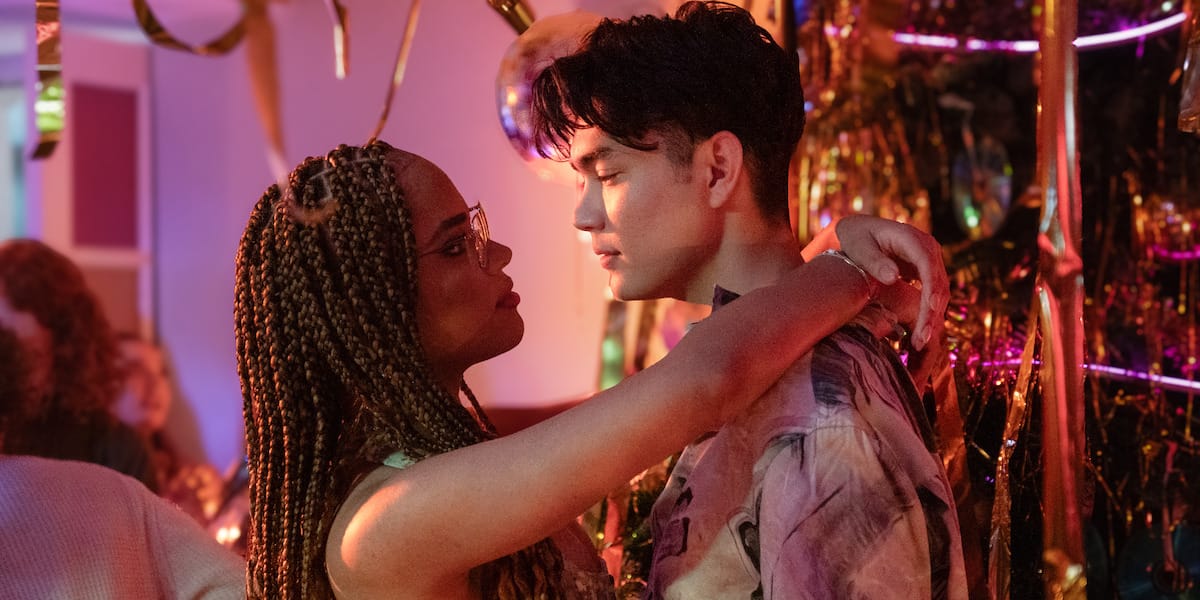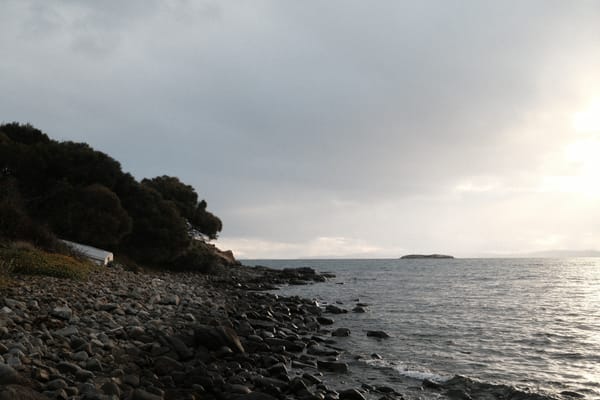On Heartstopper, queer joy, and the problem of context.
We watched the latest season of Heartstopper this week, at first an episode or two at a time, and then the back half of the season all in one night.

The following post contains spoilers for season three of Heartstopper, and discusses issues of systematic transphobia, the puberty blocker ban in England, and eating disorders. Also, I haven't (yet) read the comics, so for better or worse I'm just talking about the show here.
We watched the latest season of Heartstopper this week, at first an episode or two at a time, and then the back half of the season all in one night.
In my workshops, one of the practical tips I give for challenging our own unconscious bias is "broaden the opinions you listen to," recognising that we tend to have more bias about things that are new, different, or outside of our day-to-day. One way we can challenge this is by learning more about the world and the people within it, and by shifting by what our day-to-day entails and includes. This includes works of fiction - we're pretty simple animals, in the end: the more we receive and hear stories that show us the richness of the world, that enable us to relate or connect with or feel for characters whose experiences are different than ours, the more likely we are to be more conscious of our own bias about those experiences and identities in our day-to-day lives. It's certainly not a fix in isolation, but it's a useful, low-effort tool in our kete - and it can be fun.
For the last three years, I've basically been prescribing Heartstopper to workshop attendees. It's genuine - not just in its queer representation, but in its representation of young people in general. I've been lucky to work alongside rangatahi in our social groups on a pretty regular basis for the last five years, and the teens in Heartstopper act and talk and treat each other just like the kids in our groups do. Heartstopper is pretty family friendly - it's an easy one to watch together. It's based in lived experience - the author and artist of the comics the Netflix show is based on, Alice Oseman, is part of our community. She's been involved in the show at every step, including writing every episode.
So, yes, Heartstopper is also excellent in its queer rep. The show treats its characters with kindness and compassion - the characters communicate with each other, they do not suffer needlessly, they experience many moments of queer joy. At times I've been prepared to cringe as I felt a classic TV trope coming, to play up the drama for the narrative, only for Heartstopper's characters to respond in the ways you would hope they would, not in the ways a sitcom character would. They talk openly with their friends about their feelings. They show the kindness and generosity of understanding I've seen rangatahi give each other in real life. It's refreshing!
So, when I sat down to watch this season, I was ready for another season of wholesome queer joy - I knew this season was going to tackle Charlie's eating disorder, but I knew they'd handle it with care. What I wasn't thinking about was everything that's happened in England this year.
So, halfway through this season, when Charlie gets the news of a 4-month wait to be seen by an eating disorder service in the NHS, it hit me like a brick. Because Elle, who is trans, is 16 or 17 years old, and in the real world, her healthcare has just been severely restricted at best, or made illegal at worst.
This is where my not having read the comic comes into play - the show does not make it explicit what kinds of healthcare Elle may have accessed. In the real world, many kids her age have been on wait lists for years and years to access gender affirming care. For many, that pathway no longer exists. Some may have managed to access puberty blockers and are now left with scripts that cannot be filled. Many have certainly been forced to DIY their care.
But all of a sudden the world of the show was forced to contend with the context it is being released in. It was jarring for me to see a 4-month wait - still, let's be clear, terrible - presented as disastrous when wait times for gender identity services for Elle's age group average to multiple years.
I wondered whether they'd tackle the context these teens would now be living in. The fandom often uses 2010 as a stand-in for the beginning of the series, while Oseman talks about how they write Heartstopper and her other works as if they're set in present day. They started publishing in 2016, while this most recent season covers content first published from 2020 up until the end of last year. Filming also wrapped at the end of last year. Since then - from afar - it feels like everything has changed.
I've long felt that we've had a real need for stories of queer joy - where characters thrive, where their struggles are mundane rather than the existential threat of queerphobic violence and systematic transphobia. Heartstopper has been that for many. But I also feel that our context has shifted so dramatically, in the last few years especially. What trans women of colour have been saying for decades - that visibility is not safety - is truer and truer for many more. We see this shift in how we work, too - globally, we're in the backward swing of the pendulum, and that's a drastically different context to work in to one where progress is assumed.
So I'm glad, then, that this season of Heartstopper does address the context, in its own way. Not in terms of healthcare - though we may see that in the next (and presumably final) season. Instead, Heartstopper tackled a precursor to the dramatic regressive shifts we saw this year - a drastically hostile media environment.
Halfway through this season, Elle is invited on a local radio show to talk about the success of her artwork on social media when she's blindsided by the host "just asking questions" (JAQing off, some might call it) about single-sex spaces, assaults in bathrooms, trans inclusion, and what did you think about what the radical feminist guest had to say on the show last week, we'd love to hear your thoughts? When Elle walks out, the radio host calls out "I didn't mean to offend".
I felt this one coming, as Elle was walking into the studio. In the back of my head, I remembered how many of my friends in the UK have been blindsided by media interviews. Invited to an interview only to find out - last minute - that the other guest advocates for conversion practices. I remembered the many, many community pānui in Facebook groups and on Twitter warning people away from journalists, documentaries, interviews, newspapers. Part of me hoped this was another trope the show wouldn't fulfil. Glad doesn't feel like the right word, but I appreciate that they did. Elle walks out, her parents are furious with the station, watching from behind the studio window, a moment of pride snatched away by a system invested in Elle's alienation.
Heartstopper then addresses the impact this has - gently, with care, and not labouring on it. We see her partner care for her, as she shares about how it feels like the whole world is against her.
It's understandable why she would feel that way, with 18 mass media stories published a day about trans people in the UK with a largely negative bent; the incoming nominally-left-wing government proposing to make the ban on puberty blockers permanent; the Department of Health and Social Services rushing consultation on the ban in what many suspect is a foregone conclusion despite the growing evidence that the ban amounts to child abuse; and the anti-trans lobby, now given social license by the Cass Review, openly admitting to using trans health in children as a 'stepping stone' to abolishing trans people from public life; and clear evidence that bans like the one the UK has enacted lead to increased rates of suicide - it's overwhelming, to say the least.
The radio host in Heartstopper, besides courting sensationalism for profit, forces the role of spokesperson onto Elle - who is 16 or 17 - demanding she debate, on the spot, her own right to exist in public life. In its own way, that moment is about the show itself. I found myself wanting the show to tackle it, to make an explicit statement, to show the wider world the horrors my whanaunga are struggling through. In the moments between Charlie being told of the months-long wait and Elle's radio interview, I sat with the discomfort of feeling like the show wasn't doing enough. And then it did, and it did it with the characteristic gentleness and care we've come to expect from this show.
There's no doubt in my mind that how Heartstopper has handled this season will have some impact on the state of play in the UK and worldwide, no matter how small. What Heartstopper has always done, but has done especially so this season, is humanise rainbow young people - particularly trans young people at a time when whole political movements exist to dehumanise them.
I'm still working through what this changing context means for our work - as advocates, activists, creators, educators, as anyone working to improve the lives of trans people. My visibility now comes with tangible threats. In some cases, we're not working so much to push things forward, but prevent them from swinging back too far. Are we in a time, again, where depictions of the horrors our community currently face have an important place in media? I think the conversation about queer joy vs visibility vs tragiqueer stories is made more complicated by the wider context. Maybe the horrors necessitate some rough stories - but I'm glad we continue to have stories like Heartstopper.
At the same time, I'm brought back to a conversation I had with my friend Ruth in Lisbon, about the situation in England. She shared with me that, despite everything, the UK is looking more visibly trans on the street every day. People are still coming out, despite the horrors. We exist, despite the horrors. As always, we fight, despite the horrors.
As always, thanks for reading and for subscribing - it means the world to have you here, and I deeply appreciate having an outlet for these thoughts, and so many people willing to read and listen!
If you're not already subscribed, consider it - it's free, gives you the ability to comment, and means these posts land in your inbox ready for you to read whenever you're ready. I don't post heaps, so won't spam you, I promise!
I spent some time over the last week taking all the content that lived on my main site, which functioned a bit like a portfolio, and finding it a home here - so you'll notice a new menu up the top of the page where you can find some past art projects as well as some longer essays. This means this site now lives at jenniferkshields.nz, instead of blog.jenniferkshields.nz, but otherwise everything is the same!
Thanks again for being here - take good care, e hoa mā!

